|
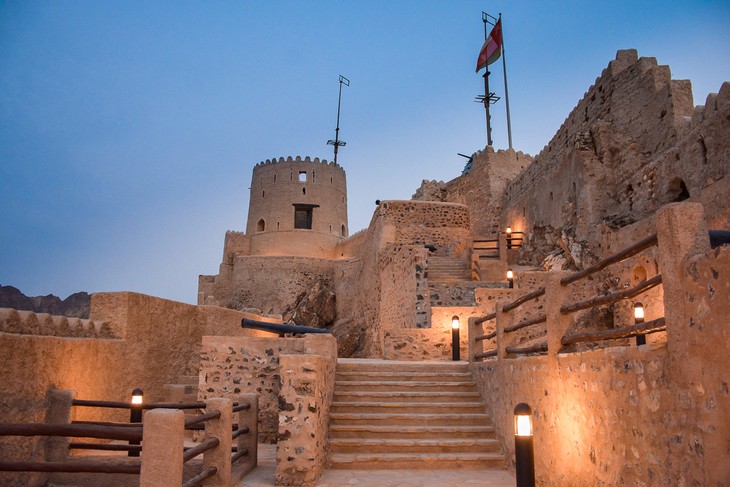 Oman is rich in forts and castles. Mutrah Fort is one of the must-visit forts. Oman is rich in forts and castles. Mutrah Fort is one of the must-visit forts.
(Photo: seeyapa.com)
|
Bao Tram: Hello, Khalfan. Thanks for joining us today.
Khalfan: Hello everyone! I am happy to talk to you today and share with you some information about my country Oman, a small Arab country. While the official language is Arabic, many people speak English as well as other languages such as Baluchi, Swahili, Hindi, Urdu, and Lawati. If you visit Oman, you will see all signs and writings both in Arabic and English, and you can speak English almost everywhere, in the shops and malls, hospitals, airports, on the street, at post offices, and elsewhere. The weekend in Oman is Friday and Saturday, so the first work day is Sunday and the last work day is Thursday. Although the main source of revenue for the economy in Oman is oil, there are other sources such a copper, natural gas, tourism, fisheries, agriculture, pottery, textiles, horse breeding, frankincense manufacturing, and others.
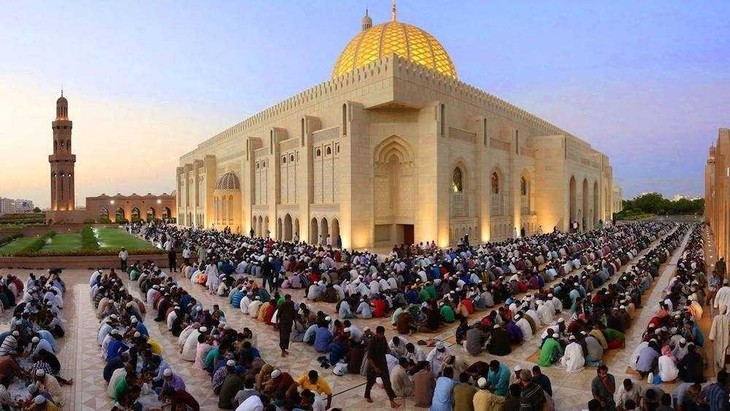
Like all other Islamic festivals, Eid al-Adha is celebrated with much zeal among the natives of Oman. (Photo: holidify.com)
|
Bao Tram: What is the first thing we should know about Oman and its culture? What is the distinctive culture of Oman?
Khalfan: It will take me a lot of time talking about Oman but I think now I should focus on a few facts and places that would be interesting to know about. Let me start by the interesting fact that Oman is one of the best places in the world for bird watching; birds come from Asia, Europe and Africa.
There are 2 main festivals in Oman. The first one is called Eid Al-Fitr. It’s a 3-day religious festival following the month of Ramadan (the month of fasting). The second festival is called Eid Al-Adha, also a 3-day religious festival, which is about 2 months after the first festival (Eid Al-Fitr).
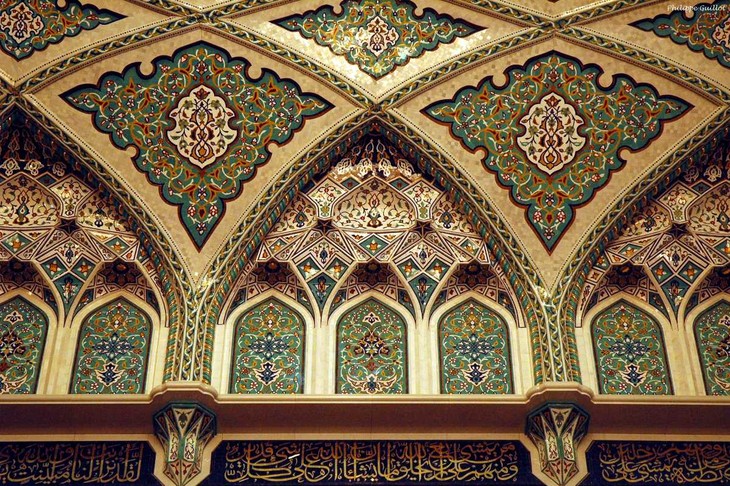
A glimpse of an Omani mosque (Photo: holidify.com)
|
Bao Tram: Which places do you advise people to get a good overview of your country?
Khalfan: If you are looking for something more traditional and historical, there are many forts and castles that demonstrate the long history of Oman. These are almost in every major town of Oman. You could also visit pottery factories (like the one in the town of Nizwa), textile factories (like the one in the town of Samail), and you can visit ship building factories (like the one in the town of Sur).
Without going into detailed descriptions, other sightseeing places you could visit are: Jabel Akhdar, Jabel Shams, Masirah Island, Ras Al-Jinz (for turtle watching), Women-only Market in Ibra, Sultan Qaboos Grand Mosque in Muscat, Matrah Traditional Market in Muscat.
You should also save some time to visit the major towns and cities in Oman, such as Muscat, Barka, Shinas, Sohar, Saham, Rustaq, Ibri, Buraimi, Nizwa, Sur, Samail, Salalah, Ibra, Musanadam, and Khasab.
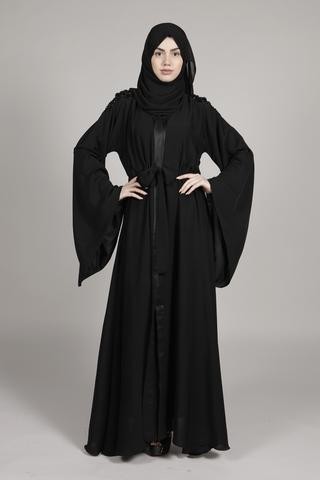
Abayas are most commonly black. (Photo: meangrrrls.com)
|
Bao Tram: What else should people not miss in Oman?
Khalfan: Let’s talk a bit about traditional foods. There are some traditional foods that you should try if you visit Oman, such as drinking Omani Coffee with dates (dates is fruit from date palm trees)
Or drinking Omani coffee with Omani halwa (which is jelly-type sweets). Other examples of traditional foods include Kabsah, Kabooli, Makoosah, Orsiyyah, Harees, biryani, Mendi, Shuwa, mshakeek, and Qabeesah. I wish I have time to talk to you about all of these, but I am sure you can search for more information about each of them.
|
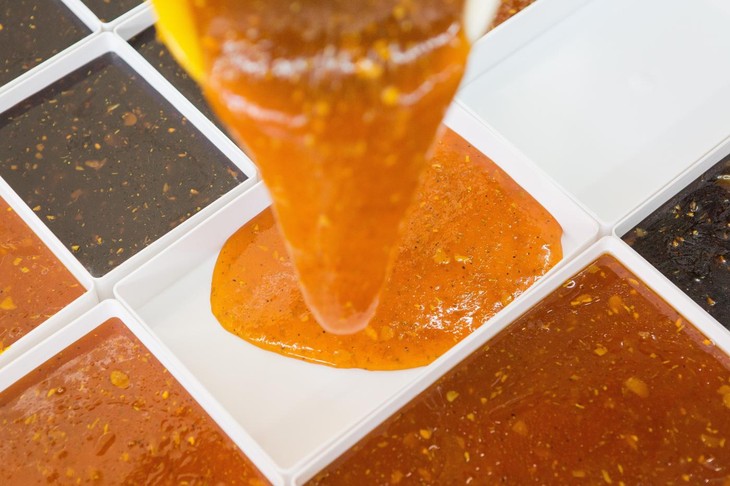 A flavoured gelatinous dessert, Omani halwa is popular across the Gulf. A flavoured gelatinous dessert, Omani halwa is popular across the Gulf.
(Photo: middleeasteye.net)
|
Bao Tram: Clothes sometimes say a lot about the culture of a country. What do Omani women and men wear? Are there any taboos?
Khalfan: In Oman, women may dress freely in the way they want; however, traditionally most Omani women, when they go out they wear abaya (long black beautifully designed dress), with some kind of brightly colored head cover, like head scarf, but not covering their face.
Men wear a long baggy ankle-length gown (called dishdasha, and usually white in color) with some kind of head cover, either massar (traditional turban) or kummah (traditional cap).
Oman is a very liberal country. If you visit Oman you will be free to wear anything that is decent; anything that doesn’t violate public respect and norms; just similar to what you would wear in Vietnam, for example.
Bao Tram: Are there any interesting facts about Oman that not many people know?
Khalfan: There are lots of free services in Oman. For example, schooling education is free from grade 1 until grade 12. College education is also free for those who receive high grades in grade 12, almost anyone with 75% and above may get a full scholarship from the government to do their college education. In Oman, citizens do not need to get health insurance as all health services are fully free. If you work in Oman, your salary is tax-free, but if you are a citizen a very small amount will be deducted for social security (saved for your end of service gratuity and retirement pension).
Bao Tram: Before doing this interview, I remember you said you want to correct some misconceptions people may have about Oman. What are they?
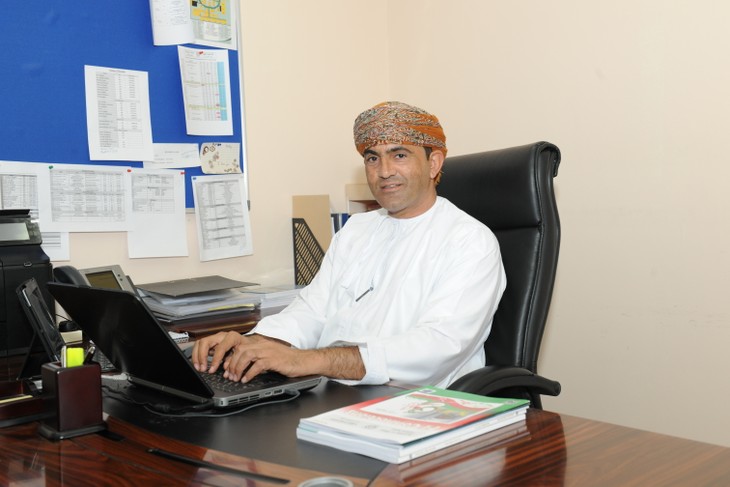 Dr. Khalfan Hamed Alharrasi Dr. Khalfan Hamed Alharrasi
Assistant Professor - Head of Essential Skills Unit, University of Nizwa (Oman)
Educational Consultant and ESL/EFL Trainer at Midwest Educational Group LLC
|
Khalfan: In addition to everything I said about Oman so far, I should correct some serious and frequent misconceptions that some people may have about Oman.
Some people think that Oman is a country of mountains and deserts, a country of camels and heat, a country where there are uneducated and oppressed women. This is all false and the opposite is the truth!
Oman is a highly developed and modernized country with cutting-edge technology in almost every corner of the country, strong economy, with both men and women equally contributing to the development of the country, and with both genders equally assuming a huge number of professions and jobs.
In Oman, women are highly educated, highly qualified, work in all types of professions, and assume leadership positions in the country – for example, the minister of education in Oman is a female, and the minister of higher education in Oman is also a female.
In case you are wondering, women in Oman do cover their head but don’t cover their face, generally speaking, and yes they do drive cars!
At the end of my talk to you today I should mention that Oman is a very safe country, where crime is also almost nonexistent. However, caution is always advisable anywhere in the world.
Bao Tram: Thank you so much, Khalfan, for joining us today and sharing with us an interesting overview of Oman and its culture. Now I know that in addition to a breathtaking natural beauty, Oman is embracing modernization and progress while retaining the core aspects of its culture and heritage.
Khalfan: Finally, I am proud to tell you that Omani people are very kind; they love to know about, and respect, other cultures, religions, and backgrounds. They are always happy to help and talk to foreigners. So, you are very welcome to Oman anytime. Thank you for listening and have a good day!